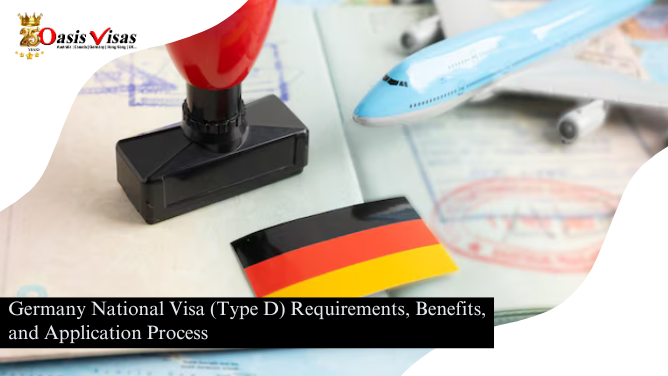
If you are planning to stay in Germany for more than 90 days, you will need a Germany National Visa (Type D). This visa is for individuals who wish to work, study, join family, or settle in Germany for an extended period. Unlike a Schengen visa, which allows short stays in the Schengen area, the national visa is a long-term visa that serves as the first step towards obtaining a residence permit in Germany.
Many people apply for this visa to build their careers, pursue higher education, or reunite with their loved ones. If you are considering moving to Germany, it is essential to understand the requirements, benefits, and application process of the national visa to ensure a smooth transition.
What is a Germany National Visa?
A National Visa (Type D) is a long-term visa issued to non-EU citizens who intend to stay in Germany for more than 90 days. This visa allows individuals to enter Germany and later apply for a residence permit to extend their stay. It is commonly issued for purposes such as employment, education, family reunification, or self-employment.
Who Needs a German National Visa?
Anyone who is not a citizen of the European Union (EU), European Economic Area (EEA), or Switzerland and plans to stay in Germany for an extended period must apply for a national visa. The visa is applicable for:
- Students who wish to pursue higher education in Germany.
- Professionals who have a job offer from a German employer.
- Researchers planning to work on scientific projects.
- Family members who want to join their relatives living in Germany.
- Self-employed individuals or entrepreneurs.
Requirements for Germany National Visa
To apply for a Germany national visa, you must meet specific requirements and submit necessary documents. The general requirements include:
1. Visa Application Form: A completed and signed application form.
2. Valid Passport: A passport that is valid for at least six months beyond the intended stay.
3. Passport-Sized Photos: Recent biometric photos as per German visa guidelines.
4. Proof of Purpose of Stay: Depending on the visa type, you must provide documents such as university admission letters, work contracts, or family reunification proofs.
5. Health Insurance: Proof of health insurance covering your stay in Germany.
6. Financial Proof: Evidence that you can support yourself financially. This could be in the form of a blocked bank account, job contract, or sponsorship letter.
7. Proof of Accommodation: Confirmation of where you will stay in Germany.
8. Language Proficiency (if required): Some visas may require proof of German language skills, such as A1 or B1 level certificates.
9. Police Clearance Certificate: A certificate proving you have no criminal record.
10. Visa Fee Payment: A non-refundable visa application fee.
Benefits of Germany National Visa
The Germany national visa offers several advantages, making it a preferred option for those looking to stay in Germany long-term:
- Pathway to Residence Permit: Once in Germany, you can apply for a residence permit, allowing you to stay legally.
- Work and Study Opportunities: Depending on the visa type, you can work or study in Germany.
- Access to Healthcare and Social Benefits: Once you obtain a residence permit, you can access Germany’s healthcare system and other social benefits.
- Family Reunification: You can bring your family members to Germany under specific conditions.
- Path to Permanent Residency and Citizenship: After staying in Germany for a certain period, you may qualify for permanent residency and later apply for citizenship.
Application Process for Germany National Visa
Applying for a German national visa involves several steps. Here is a step-by-step guide:
1. Determine the Right Visa Type: Identify the specific visa category based on your purpose of stay (study, work, family reunification, etc.).
2. Gather Required Documents: Prepare all necessary documents as per the visa type.
3. Schedule an Appointment: Book a visa appointment at the nearest German embassy or consulate.
4. Attend the Visa Interview: Visit the embassy on your scheduled date and provide biometric data, answer interview questions, and submit your application.
5. Pay the Visa Fee: Pay the required visa processing fee (varies depending on visa type).
6. Wait for Processing: The processing time for a Germany national visa can take anywhere from a few weeks to several months, depending on your application and visa category.
7. Receive Visa Decision: Once approved, you will receive your Germany national visa and can travel to Germany.
8. Apply for a Residence Permit: After arriving in Germany, visit the local immigration office to apply for a residence permit before your visa expires.
Common Reasons for Visa Rejection
While applying for a Germany national visa, some applicants face rejection due to various reasons. To increase your chances of approval, avoid these common mistakes:
- Incomplete or incorrect application forms.
- Insufficient financial proof.
- Lack of valid health insurance.
- Unclear purpose of stay.
- Missing important documents.
The Germany national visa is an essential requirement for anyone planning to stay in Germany for more than 90 days. Whether you want to study, work, or reunite with family, this visa serves as the first step towards achieving your goal. Understanding the requirements, benefits, and application process can help you prepare well and avoid delays. If you are ready to take the next step, start your application today and begin your journey to Germany!










